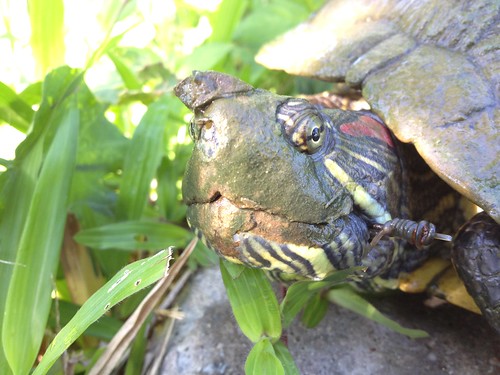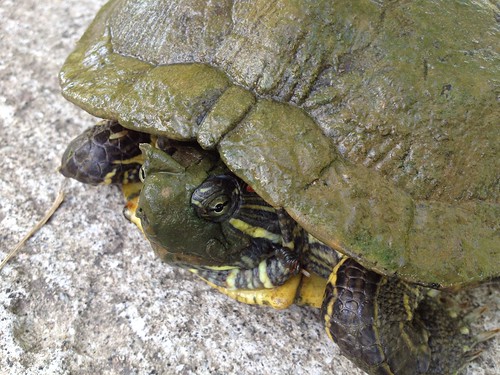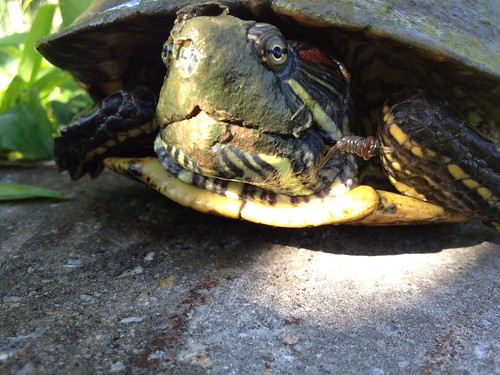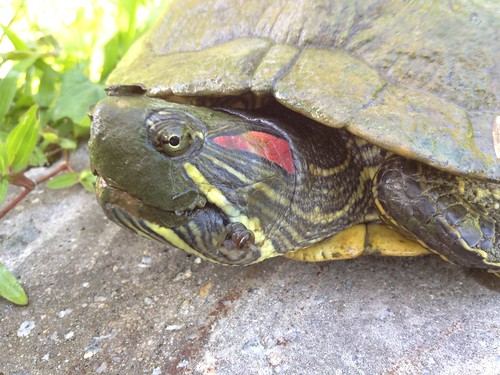
If there's one thing I can't stand, it's seeing debris left behind by careless or irresponsible anglers. On too many occasions, I find rubbish that has been left on the shore after a fishing session, whether it's unused bait, discarded catch, lightsticks, or tangles of fishing line. I do wish that more anglers would take the effort to dispose of their trash properly, especially because of the risks of wildlife being harmed by hooks and fishing line.
There have been examples of local wildlife being needlessly injured or killed by fishing gear, from birds such as Oriental pied hornbill (Anthracoceros albirostris) and barn owl (Tyto alba), to reptiles like estuarine crocodile (Crocodylus porosus), dog-faced water snake (Cerberus rynchops), and Malayan water monitor (Varanus salvator). Even wild boar (Sus scrofa vittatus) have not been spared!
Today, I discovered yet another unfortunate victim of irresponsible anglers.
I had cycled to the Lorong Halus Wetlands this morning. Curious about the numerous small fishes in the drain that flowed along the road on the way in, I went down for a closer look. They turned out to be mostly guppies (Poecilia reticulata) and eastern mosquitofish (Gambusia affinis), both non-native livebearers that have proven to be very successful in Singapore. While chasing a school of these fishes, I stumbled upon a large red-eared slider (Trachemys scripta elegans), with a carapace length of around 30 centimetres, that appeared to be resting amongst some vegetation close to the bank.
Now, while I dislike the fact that red-eared sliders have become so abundant at the expense of our native turtle species, thanks to all the people who
I was bewildered, and taking care to avoid the turtle's beak and claws, I grabbed it by the shell and attempted to lift it out of the water. It didn't budge very far; it turned out that the turtle was snagged on something. As I took a closer look, I realised to my horror that the turtle had a fishing hook stuck in its mouth, with a length of fishing line entangled amongst the vegetation.
No wonder it couldn't swim off. Who knows how long it had been trapped there?
I was able to use my pocketknife to cut off most of the fishing line, freeing it from the vegetation. However, the hook was still firmly embedded in the flesh at the corner of its mouth, and I didn't want to risk tugging on the hook too much and causing further injury.
I clambered out of the drain and decided to contact the Wildlife Rescue team of the Animal Concerns Research and Education Society (ACRES), who would have the resources to render assistance.
After making a phone call and informing them about the turtle in distress, I waited by the roadside with the turtle on the ground, making sure that it didn't escape back into the water, or that it didn't try to dash across the road. Considering that the ACRES Wildlife Rescue Centre is located at Jalan Lekar in Choa Chu Kang, it would take them a while to reach Lorong Halus.
This was the chance for me to take some photographs of the turtle and its injury. I didn't have my usual camera with me, but at least I had my iPhone 4S.

The hook is embedded in the left side of the turtle's mouth.

You can see the hook here, near the base of the turtle's neck.




While I waited, there were several occasions when passing cyclists saw the turtle and stopped for a closer look. I made use of this excellent opportunity to point out the hook in its mouth, and everybody who saw shook their heads in pity and concern. At the very least, I hope that this left a lasting impression in their minds about the dangers of irresponsible anglers who do not bother to throw their unwanted fishing gear into the dustbin.
Eventually, the ACRES van arrived. The turtle was transferred to a crate, to be sent to the veterinarian to get the hook removed. I chatted a bit with the two gentlemen from ACRES (whose names I didn't remember to obtain in my excitement, though my receipt acknowledging the transfer of the turtle over to the care of ACRES was signed by a James Chua), and it turns out that this was their first wildlife rescue case for today. One of them, while inspecting the injury, commented that the hook was quite rusty, so it is possible that it had been lodged in the turtle's mouth for some time. Hopefully the hook can be removed without complications, and that the red-eared slider will make a full recovery.
Turtles can be very hardy and survive some pretty horrific living conditions and injuries, but it also means that on the flipside, this one might have eventually died a slow, agonising death if I had not happened to be chasing fish in the drain and spotted it. My heartfelt thanks go to ACRES for the prompt response, and for the often risky work they do, attending to people's calls to relocate or rescue wildlife, some of which can be much more dangerous to handle than a red-eared slider.
Being personally involved in the rescue of a hooked turtle has made me even more convinced that we need to come down hard on anglers who litter and ruin their own fishing spots with their trash. Fishing hooks don't just kill wildlife, both on land and in the water. What about the risk to beachgoers? Can you imagine little children running around barefoot, expecting to have fun digging holes in the beach and building sandcastles, only to end up learning a painful lesson about the irresponsibility of some anglers? Have these idiots ever paused to consider that their trash doesn't simply go away, and even if it is washed elsewhere, it simply continues to be a problem in another location?
In a perverse fit of anger, I sometimes wish that anglers who discard their gear in such a manner would end up stepping on their own (rusty) hooks, or get garotted by fishing line. The fishing community can be a powerful voice to speak up for protecting, restoring, and managing our waters for the betterment of all. But in Singapore, it seems like too many people pick up the hobby without understanding the need to care for the surrounding environment, the very same habitat of the fishes that sustain their passion in the first place. Do they feel that when compared with the impacts of development, all the trash that's already in the water, and pollution from shipping and industries, it doesn't make any difference at all whether they make the effort to properly dispose of their own rubbish? Are they oblivious to the potential damage caused by their actions? Or is it a case of wanting to care but giving up in despair because everyone else already doesn't care, so one might as well not bother, as long as there are still fish to be caught for now?
It's downright depressing. But at least for today, I made a difference to the life of a red-eared slider.